It’s almost here, and whatcha gonna do? Weekend planning’s SO much more complicated than it used to be, partly because in Portland there are so many more choices than there used to be. So here are a few of many, many possible suggestions:
*******************************************************************
 PORTLAND TAIKO’S “A TO Z”: That’s not A to Z, the negociant-style Oregon wine blenders. It’s A to Z, Ann to Zack. Portland Taiko‘s first big concert of the year will be a drum-banging stroll down memory lane with Ann Ishimuru and Zack Semke, back for a reunion gig with the company they founded 15 years ago. The repertory for these two shows, at 3 and 8 p.m. Saturday in the Fir Acres Theatre at Lewis & Clark College, will be drawn from the troupe’s first decade. Big drums, sweet violin, a rousing, joyful noise. Come join the fun.
PORTLAND TAIKO’S “A TO Z”: That’s not A to Z, the negociant-style Oregon wine blenders. It’s A to Z, Ann to Zack. Portland Taiko‘s first big concert of the year will be a drum-banging stroll down memory lane with Ann Ishimuru and Zack Semke, back for a reunion gig with the company they founded 15 years ago. The repertory for these two shows, at 3 and 8 p.m. Saturday in the Fir Acres Theatre at Lewis & Clark College, will be drawn from the troupe’s first decade. Big drums, sweet violin, a rousing, joyful noise. Come join the fun.
Bias alert: I’m a member of Portland Taiko’s board. Then again, if I didn’t really like what this company does, I wouldn’t be on its board.
*****************************************************
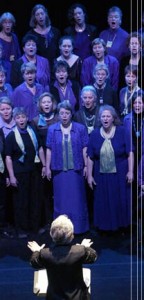 “WELL-BEHAVED WOMEN RARELY MAKE HISTORY”: But in Portland, rowdy women make very good music. In two shows Saturday, 4 and 8 p.m. at St. Mary’s Academy Theater, the 100-plus-voice Aurora Chorus will raise the roof with a program celebrating “women in history who boldly colored outside the lines and didn’t care what was written into their permanent records.” Among those ceiling-busters are locals including Portland police chief Rosie Sizer, artist Lillian Pitt, and Gennie Nelson, founder of Sisters of the Road.
“WELL-BEHAVED WOMEN RARELY MAKE HISTORY”: But in Portland, rowdy women make very good music. In two shows Saturday, 4 and 8 p.m. at St. Mary’s Academy Theater, the 100-plus-voice Aurora Chorus will raise the roof with a program celebrating “women in history who boldly colored outside the lines and didn’t care what was written into their permanent records.” Among those ceiling-busters are locals including Portland police chief Rosie Sizer, artist Lillian Pitt, and Gennie Nelson, founder of Sisters of the Road.
The Aurora Chorus is led by Joan Szymko, who’s been misbehaving her own historical path in Portland and Seattle for many years, creating a rambunctiously engaged musical career that’s also seen her lead the Seattle Women’s Ensemble and the women’s chamber ensemble Viriditas, and act as musical director for the irreverent acrobatic and aerial theater artists of Do Jump! Extremely Physical Theatre. Through a quarter-century or so Szymko has also been a serious and talented choral composer (she has more than 50 octavos in publication), and this spring the American Choral Directors Association chose her as composer for next year’s Raymond W. Brock Commission, a task that’s gone in the past to the likes of Daniel Pinkham, Gian Carlo Menotti, Gwyneth Walker and David Conte. Excellent, if possibly ill-behaved, company.
*******************************************************
TRIPLE-THREAT TICKETS: You’ve got your Third Angle. You’ve got your Third Rail Rep. And you’ve got your Three Sisters. Somewhere in there lies an exceedingly un-square root. Let’s take ’em one at a time:
Third Angle New Music Ensemble with Jennifer Higdon: As I type I’m listening to a recording that Third Angle artistic director Ron Blessinger gave me of Philadelphia composer and double Grammy winner Jennifer Higdon‘s Celestial Hymns and Zaka, and I’m liking it a WHOLE lot.
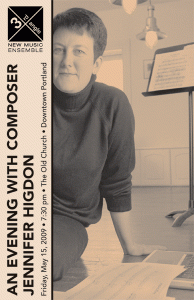 It’s jangly, insouciant, nervous, brash yet somehow introspective music. It’s thoroughly American. And it’s accessible, which in this case means not dumbed down but smart and extroverted — speaking, like Gershwin and Copland and Ellen Taaffe Zwilich and many others, in a voice that would actually like to be heard by an intelligent general audience. Makes me think of Bartok crossed with Charles Lloyd, maybe because of the clarinet and flute.
It’s jangly, insouciant, nervous, brash yet somehow introspective music. It’s thoroughly American. And it’s accessible, which in this case means not dumbed down but smart and extroverted — speaking, like Gershwin and Copland and Ellen Taaffe Zwilich and many others, in a voice that would actually like to be heard by an intelligent general audience. Makes me think of Bartok crossed with Charles Lloyd, maybe because of the clarinet and flute.
What’s more, from everything I’ve heard and read, Higdon’s a delightful person, exactly the sort of public ambassador that contemporary classical music (I know; that sounds like an oxymoron. Can you think of a better way to say it?) needs. This concert, with Higdon on hand and Third Angle playing music by her and some of her talented former composition students, is at 7:30 p.m. Friday in The Old Church. Should be a barn-burner.
Fabuloso at Third Rail Rep: I caught this last Saturday on its opening weekend, and it’s an odd little duck of a play, with just the right quack to put its appeal over. John Kolvenbach‘s closely cropped comedy is about two couples — one staid and settled; the other impossibly improvisational — who somehow wind up sharing a one-bedroom apartment. It’s about growing up but not giving in, and maybe even about deciding to have children, and in spite of its extremities it’s a sweet domestic little waterfowl when you get down to it.
Fine performances by Third Rail regulars Stephanie Gaslin, Philip Cuomo and Valerie Stevens, and a true bell-ringer of exuberantly controlled excess by Tim True. Tim gets the juicy parts, but there’s not a touch of self-indulgence in what he does: The show would fall flat if he didn’t stay in tune with the other three instead of winging off into the wilderness on his own. Once again from Third Rail and director Slayden Scott Yarbrough, a model of ensemble theater. Things start almost itchy-slow, but that’s part of the geography of the play, which soon enough goes bang-bang-bang. It’s worth catching, and you have through May 31 to do it.
Three Sisters at Artists Rep: In one corner, Anton Chekhov, subtle and masterful progenitor of contemporary drama. In the other corner, Tracy Letts, brash Steppenwolf rabble-rouser and Tony- and Pulitzer-winning author of August: Osage County.
How does Letts handle Chekhov in this world-premiere translation? “This Three Sisters starts as a drama about quiet desolation, then takes the quiet behind the barn and shoots it,” Aaron Mesh writes in Willamette Week.
Not sure what that means, but it sure makes me want to see the show and find out. It keeps brawling through June 14 at Artists Rep.
*************************************************************
THE HUNCHBACK OF MANTUA: Better known as Rigoletto, Giuseppe Verdi‘s operatic potboiler from 1851 that’s fabled for the nefarious duke’s lilting La Donna e Mobile, which everyone knows and comparatively few realize comes from Rigoletto. (Nor do most people know it’s one of the most flippantly sexist pop tunes ever written, but then, that’s the duke: What a guy. If you’re sensitive, it’s best not to understand Italian — or to read the supertitles.)
Portland Opera‘s current production, which ends with performances Thursday and Saturday evenings at Keller Auditorium, is straightforward and traditional and, despite a problem here and there, a welcome affirmation of what a gorgeous score Verdi wrote. Good, solid drama, too: The three hours muscle their way through with no flabbiness. In theater and opera, if you’ve got a hump or a limp or a big nose you tend not to get happy endings. Think Quasimodo, Rigoletto, Cyrano, Richard III. Well, there is Tiny Tim. But he can’t sing, and Rigoletto can. Huge difference.
I caught last Friday’s opening night performance and fell in love, once again, with the score. David Stabler’s positive-with-reservations review in The Oregonian seemed spot-on. Two more chances to soak in that glorious sound.
**************************************************************
 Portland Taiko. Rich Iwasaki/2009
Portland Taiko. Rich Iwasaki/2009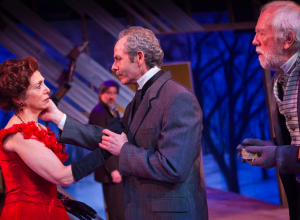 There isn’t much story to The Cherry Orchard, but there are themes, counter-themes, motifs. It’s chamber music, and the way we hear it can be startlingly different from production to production, depending not just on our own life experiences (interpreting Chekhov relies to an extreme on what the audience brings to it) but also on the emphases of interpretation on the stage: Do we concentrate on the cello tonight, or the bassoon? In truth, I suspect that even more so than ordinarily, every member of the audience sees a different play when watching Chekhov.
There isn’t much story to The Cherry Orchard, but there are themes, counter-themes, motifs. It’s chamber music, and the way we hear it can be startlingly different from production to production, depending not just on our own life experiences (interpreting Chekhov relies to an extreme on what the audience brings to it) but also on the emphases of interpretation on the stage: Do we concentrate on the cello tonight, or the bassoon? In truth, I suspect that even more so than ordinarily, every member of the audience sees a different play when watching Chekhov.
 The rush began during that final fade, when the proper response was to sit still and let the emotional accumulation of this three-and-a-half-hour American journey sink in. It hit full throttle when the lights came up for cattle call … I mean, curtain call. As many in the audience were rising to their feet to applaud the work of this talented company of actors, many others were bumping and bruising their ways to the aisles, trodding on toes, trailing their belongings, urging their fellow longhorns on so they could get out first. Show’s over. Drinks and bathrooms calling.
The rush began during that final fade, when the proper response was to sit still and let the emotional accumulation of this three-and-a-half-hour American journey sink in. It hit full throttle when the lights came up for cattle call … I mean, curtain call. As many in the audience were rising to their feet to applaud the work of this talented company of actors, many others were bumping and bruising their ways to the aisles, trodding on toes, trailing their belongings, urging their fellow longhorns on so they could get out first. Show’s over. Drinks and bathrooms calling.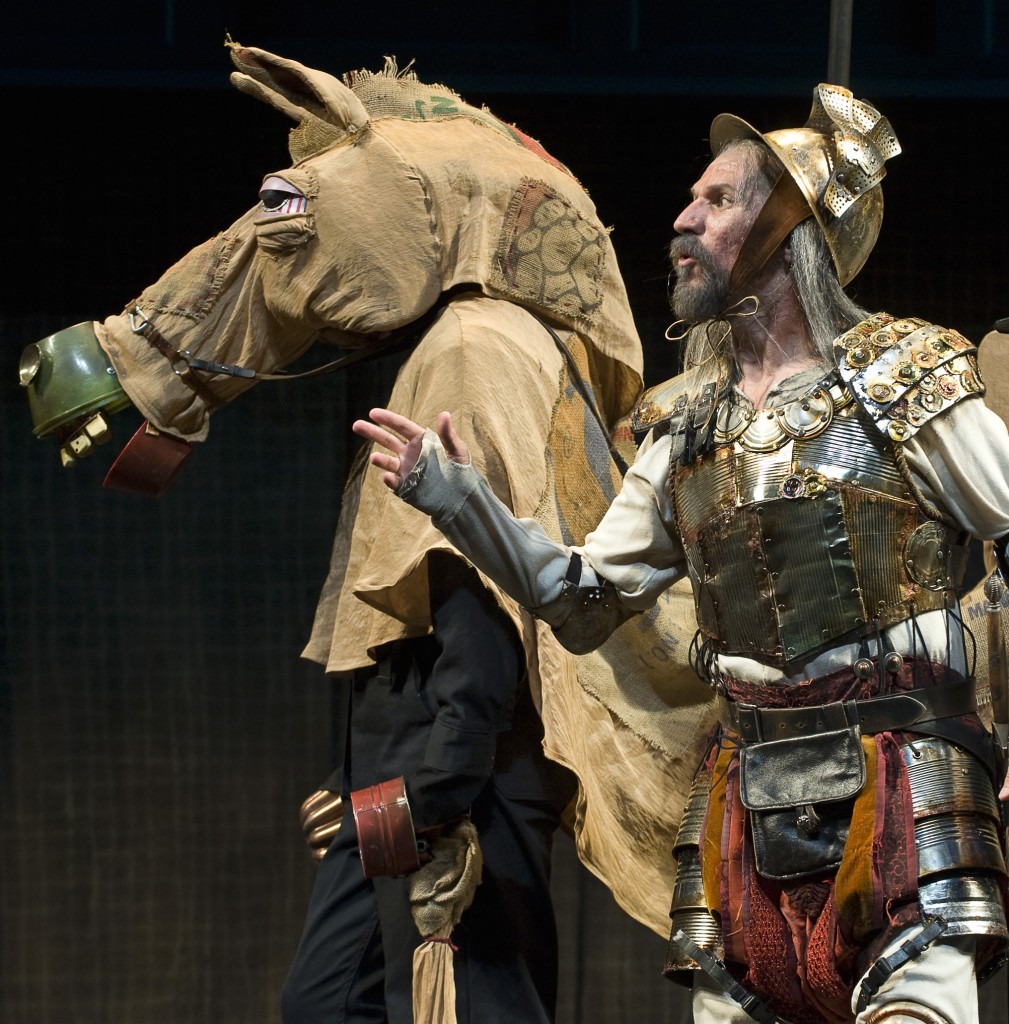
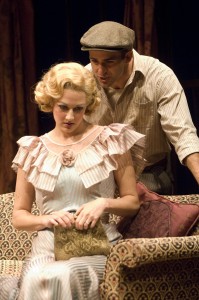 The festival’s Don Quixote is a world-premiere adaptation by the playwright
The festival’s Don Quixote is a world-premiere adaptation by the playwright 
 PORTLAND TAIKO’S “A TO Z”: That’s not A to Z, the negociant-style Oregon wine blenders. It’s A to Z, Ann to Zack. P
PORTLAND TAIKO’S “A TO Z”: That’s not A to Z, the negociant-style Oregon wine blenders. It’s A to Z, Ann to Zack. P “WELL-BEHAVED WOMEN RARELY MAKE HISTORY”: But in Portland, rowdy women make very good music. In two shows Saturday, 4 and 8 p.m. at St. Mary’s Academy Theater, the 100-plus-voice
“WELL-BEHAVED WOMEN RARELY MAKE HISTORY”: But in Portland, rowdy women make very good music. In two shows Saturday, 4 and 8 p.m. at St. Mary’s Academy Theater, the 100-plus-voice  It’s jangly, insouciant, nervous, brash yet somehow introspective music. It’s thoroughly American. And it’s accessible, which in this case means not dumbed down but smart and extroverted — speaking, like Gershwin and Copland and
It’s jangly, insouciant, nervous, brash yet somehow introspective music. It’s thoroughly American. And it’s accessible, which in this case means not dumbed down but smart and extroverted — speaking, like Gershwin and Copland and